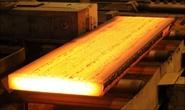Market Segment

June 6, 2014
Buy America vs. Buy American
Written by Sandy Williams
The terms Buy America and Buy American are not interchangeable. CSI Executive VP, Finance & Administration Brett Guge explains the difference:
“The longstanding historical standard for direct government procurement is “Buy American,” which requires only that the steel products used in government projects must have been “substantially transformed” in the U.S.
“Buy America,” on the other hand, came into being in 1982 as an interpretation of the Department of Transportation, requiring that steel and iron products used in federally assisted highway and transit projects must have been “melted and poured” in the U.S. It is this “melted and poured in the U.S.” standard which is currently being pushed by some into other government procurement programs besides highways and transit.
“CSI’s position is to keep Buy America, but to make changes to allow a fairer treatment for the slab converters in today’s steel industry (which did not exist as slab converters in 1982). We are suggesting a nationwide Buy America waiver for imported steel slab, just as a nationwide Buy America waiver has been historically provided for projects supplied with imported pig iron and iron pellets.”
In SMU’s article “CSI & NLMK Fight to be Recognized as American Steel Producers,” a Department of Commerce report on slab availability was cited.
A study by the Dept. of Commerce and U.S. International Trade Commission in December 2001 (Publ. 3479) found “The vast majority of U.S.-produced slabs are internally consumed by the domestic slab producers in the production of other steel products, with a very minor portion being sold on the commercial market.” In 2000, 99.4 percent of domestic slab shipments were internally consumed.
In a 2002 paper sent to us by Guge, “Using Safeguard Protection to Raise Domestic Rival’s costs” by James P. Durling and Thomas Prusa, it is noted that companies such as California Steel Industries rely on imported slab due to the scarcity of domestic slab availability.
According to the Durling and Prusa, firms (for example, Nucor and US Steel) that do not need to use imported slab due to their own production of “melt and pour” steel, have no “incentive to enable their rivals to compete for downstream higher margin sales.” They go on to write, “In other words if left to their own devices, domestic mills can and do choke of the supply of slab and thus can largely eliminate the competition from these new firms [conversion mills].”
A new report by the Department of Commerce initiated by the House Committee on Commerce, Justice and Science, yet to be released, confirms the earlier studies that “slabs are basically not available sale domestically,” says Guge.
Our sources report to us that US Steel has both offered and sold domestically produced slabs to the conversion mills and that they will continue to do so in the future. We are advised that from a US steel perspective, they have the ability to supply the conversion mill needs. However, as in any negotiation, price and the reliability of supply are determining factors.







